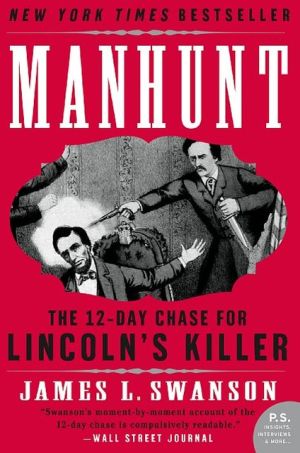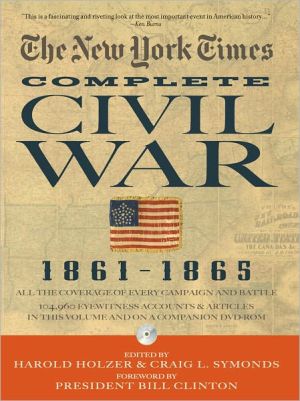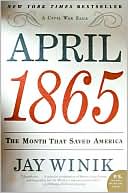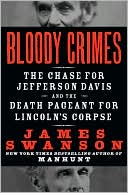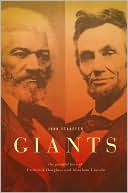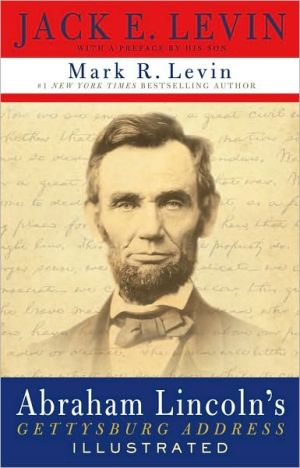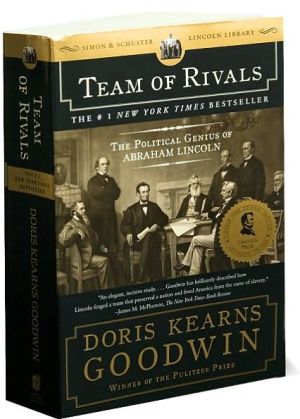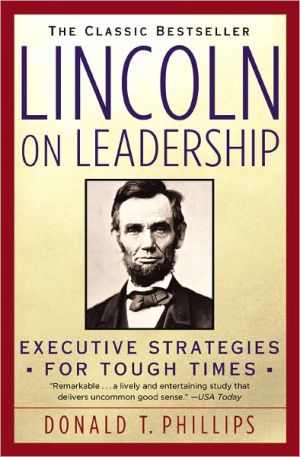Manhunt: The 12-Day Chase for Lincoln's Killer
"The murder of Abraham Lincoln set off the greatest manhunt in American history - the pursuit and capture of John Wilkes Booth. From April 14 to April 26, 1865, the assassin led Union cavalry and detectives on a wild twelve-day chase through the streets of Washington, D.C., across the swamps of Maryland, and into the forests of Virginia, while the nation, still reeling from the just-ended Civil War, watched in horror and sadness." "At the very center of this story is John Wilkes Booth,...
Search in google:
The murder of Abraham Lincoln set off the greatest manhunt in American history. From April 14 to April 26, 1865, the assassin, John Wilkes Booth, led Union cavalry and detectives on a wild twelve-day chase through the streets of Washington, D.C., across the swamps of Maryland, and into the forests of Virginia, while the nation, still reeling from the just-ended Civil War, watched in horror and sadness. James L. Swanson's Manhunt is a fascinating tale of murder, intrigue, and betrayal. A gripping hour-by-hour account told through the eyes of the hunted and the hunters, this is history as you've never read it before. The New York Times - Janet Maslin Nearly 141 years later, the body of literature about Lincoln's death is immense and seemingly exhaustive. Yet James L. Swanson's Manhunt has found a reasonably new angle from which to approach its material … he has successfully streamlined the assassination's aftermath into an action-adventure version of these events. He makes Manhunt very accessible and infuses it with high drama.
Manhunt\ The 12-Day Chase for Lincoln's Killer \ \ By James Swanson \ HarperCollins Publishers, Inc.\ Copyright © 2006 James Swanson\ All right reserved.\ ISBN: 0060518499 \ \ \ Chapter One\ "I Had This Strange Dream Again Last Night"\ John Wilkes Booth awoke Good Friday morning, April 14, 1865, hungover and depressed. The Confederacy was dead. His cause was lost and his dreams of glory over. He did not know that this day, after enduring more than a week of bad news and bitter disappointments, he would enjoy a stunning reversal of fortune. No, all he knew this morning when he crawled out of bed in room 228 at the National Hotel, one of Washington's finest and naturally his favorite, was that he could not stand another day of Union victory celebrations.\ Booth assumed that April 14 would unfold as the latest in a blur of eleven bad days that began on April 3 when Richmond, the Confederacy's citadel, fell to the Union. The very next day the tyrant, Abraham Lincoln, visited his captive prize and had the audacity to sit behind the desk occupied by the first and last president of the Confederate States of America, Jefferson Davis. Then, on April 9, at Appomattox Court House, Robert E. Lee and his glorious Army of Northern Virginia surrendered. Two days later Lincoln made a speech proposing to give blacks the right to vote, and last night, April 13, all of Washington celebrated with a grand illumination of the city. And today, in Charleston harbor, the Union planned to stage a gala celebration to mark the retaking of Fort Sumter, where the war began four years ago. These past eleven days had been the worst of Booth's young life.\ He was the son of the legendary actor and tragedian Junius Brutus Booth, and brother to Edwin Booth, one of the finest actors of his generation. Twenty-six years old, impossibly vain, preening, emotionally flamboyant, possessed of raw talent and splendid élan, and a star member of this celebrated theatrical family -- the Barrymores of their day -- John Wilkes Booth was willing to throw away fame, wealth, and promise for his cause. Handsome and charismatic, he was instantly recognizable to thousands of fans in both the North and the South. His physical beauty astonished all who beheld it. A fellow actor once described him: "Picture to yourself Adonis, with high forehead, sweeping black hair, a figure of perfect youthful proportions and the most wonderful black eyes in the world. Such was John Wilkes Booth. At all times his eyes were his striking features but when his emotions were aroused they were like living jewels." Booth's passions included fine clothing, delectable women, and the romance of lost causes.\ Booth's day began in the dining room of the National, where he was seen eating breakfast with Miss Carrie Bean. Nothing unusual about that -- Booth, a voluptuous connoisseur of young women, never had trouble finding female company. Around noon he walked over to Ford's Theatre on Tenth Street between E and F, a block above Pennsylvania Avenue, to pick up his mail. Accepting correspondence on behalf of itinerant actors was a customary privilege Ford's offered to friends of the house. Earlier that morning Henry Clay Ford, one of the three brothers who ran the theatre, ate breakfast and then walked to the big marble post office at Seventh and F and picked up the mail. There was a letter for Booth.\ That morning another letter arrived at the theatre. There had been no time to mail it, so its sender, Mary Lincoln, used the president's messenger to bypass the post office and hand-deliver it. The Fords did not even have to read the note to know the good news it contained. The mere arrival of the White House messenger told them that the president was coming tonight! It was a coup against their chief rival, Grover's Theatre, which was offering a more exciting entertainment: Aladdin! Or His Wonderful Lamp. Master Tad Lincoln and chaperone would represent the family there. The letter, once opened, announced even greater news. Yes, the president and Mrs. Lincoln would attend this evening's performance of Tom Taylor's popular if tired comedy Our American Cousin. But the big news was that General Ulysses S. Grant was coming with them. The Lincolns' timing delighted the Fords. Good Friday was traditionally a slow night, and news that not only the president -- after four years a familiar sight to Washingtonians -- but also General Grant, a rare visitor to town and fresh from his victory at Appomattox, would attend, was sure to spur ticket sales. This would please Laura Keene, who was making her one thousandth performance in the play; tonight's show was a customary "benefit," awarding her a rich share of the proceeds. The Lincolns had given the Fords the courtesy of notification early enough in the day for the brothers to promote their appearance and to decorate and join together the two boxes -- seven and eight -- that, by removal of a simple partition, formed the president's box.\ By the time Booth arrived at Ford's, the president's messenger had come and gone. Sometime between noon and 12:30 p.m. as he sat outside on the top step in front of the main entrance to Ford's reading his letter, Booth heard the galvanizing news. In just eight hours the subject of all of his brooding, hating, and plotting would stand on the very stone steps where he now sat. This was the catalyst Booth needed to prompt him to action. Here. Of all places, Lincoln was coming here. Booth knew the layout of Ford's intimately: the exact spot on Tenth Street where Lincoln would step out of his carriage; the place the president sat every time he came to the theatre; the route through the theatre that Lincoln would walk and the staircase he would ascend to the box; the dark, subterranean passageway beneath the stage; the narrow hallway behind the stage that led to the back door that opened to Baptist Alley; and how the president's box hung directly above the stage. Booth had played here before, most recently in a March 18 performance as Pescara in The Apostate.\ \ Continues... \ \ \ \ Excerpted from Manhunt by James Swanson Copyright © 2006 by James Swanson. Excerpted by permission.\ All rights reserved. No part of this excerpt may be reproduced or reprinted without permission in writing from the publisher.\ Excerpts are provided by Dial-A-Book Inc. solely for the personal use of visitors to this web site. \ \ \
1I had this strange dream again last night92I have done it353His sacred blood624We have assassinated the president955Find the murderers1336That vile rabble of human bloodhounds1767Hunted like a dog2248I have some little pride2559Useless, useless28110So runs the world away344John Wilkes Booth's diary
\ From Barnes & NobleHas any other month in American history been as tumultuous as April 1865? In a matter of weeks, Richmond fell; the Confederacy collapsed and surrendered; President Abraham Lincoln was shot and killed; and, for 12 days, Lincoln's assassin, famed actor John Wilkes Booth, outraced and outsmarted his would-be captors before he was cornered in a barn and shot dead. In Manhunt, James L. Swanson retraces the search for a celebrity who succeeded in changing our history.\ \ \ \ \ Entertainment Weekly (Grade: A)“A gripping page-turner . . . Riviting . . . Booth comes across as viscerally real.”\ \ \ Entertainment Weekly“A gripping page-turner . . . Riviting . . . Booth comes across as viscerally real.”\ \ \ \ \ New York Times“An action-adventure . . . infuse[d] with high drama. . . . A multifaceted chronicle.”\ \ \ \ \ Washington Post“Vividly readable example of the you-are-there genre . . . managed with ‘CSI’ immediacy.”\ \ \ \ \ Wall Street Journal“Told expertly . . . Swanson’s moment by moment account of the 12-day chase is compulsively readable.”\ \ \ \ \ Boston Globe“Extraordinary . . . Brilliant . . . As gripping as any tightly scripted crime drama”\ \ \ \ \ Janet MaslinNearly 141 years later, the body of literature about Lincoln's death is immense and seemingly exhaustive. Yet James L. Swanson's Manhunt has found a reasonably new angle from which to approach its material … he has successfully streamlined the assassination's aftermath into an action-adventure version of these events. He makes Manhunt very accessible and infuses it with high drama.\ — The New York Times\ \ \ \ \ Publishers WeeklyThomas has done many solid jobs of acting in all mediums since his television days on The Waltons, but it's the memories of the wide open American country tones of his flexible voice that add immeasurably to his reading of the audio version of Swanson's intensive new book about the assassination of Abraham Lincoln and the full-throttle hunt for the conspirators who planned and carried out the deed. Thomas's nuanced but never hyped narration serves as a seamless link between the words of the individual characters he brings to life. Some of the voices work better than others: his Lincoln is perhaps a bit too young and straightforward, especially compared to the darker, richer oratory of actors connected to the role such as Raymond Massey. But his John Wilkes Booth is just about perfect, catching the desperation and increasing lunacy of an actor getting ready for his role in history. And the other major characters-plotters, hunters, politicians, distraught family members-all bring a familiar story to exciting new life. Simultaneous release with the Morrow hardcover (Reviews, Dec. 12, 2005). (Feb.) Copyright 2006 Reed Business Information.\ \ \ \ \ Library JournalSmall wonder that Manhunt has been optioned as a major motion picture. In this fast-paced, hour-by-hour account of the 12 days following Lincoln's assassination at Ford's Theatre on April 14, 1865, Swanson (coauthor, with Daniel R. Weinberg, of Lincoln's Assassins: Their Trial and Execution) allows the reader to ride along with the Union cavalry and federal agents through the streets of the nation's capital and the wilds of Maryland and Virginia in pursuit of John Wilkes Booth, his coconspirators, and the host of rebel enablers who constituted a viable Confederate underground railroad. Swanson's eye for detail and his excellent thumbnail sketches of the figures involved bring the chronicle alive. There was the simultaneous assassination attempt on Secretary of State William Seward, and Secretary of War Stanton's pivotal role in keeping the nation together during the unrest, stoked by an irresponsible press, following Lincoln's death. Swanson details the conditions endured by Booth while on the run and the foolish mistakes committed by him and his pursuers during the long chase until the last stand at a farm near Port Royal, VA, on April 26. Swanson concludes with discussions of the trial and execution of the four secondary conspirators, the subsequent squabbling over reward money, and the unfolding of the post-assassination lives of the drama's major personalities. Ably researched and seamlessly written, this engrossing book is recommended for all Civil War and Lincoln collections-and all libraries.-John Carver Edwards, Univ. of Georgia Libs., Cleveland Copyright 2005 Reed Business Information.\ \ \ \ \ Wall Street Journal"Told expertly . . . Swanson’s moment by moment account of the 12-day chase is compulsively readable."\ \ \ \ \ (Grade: A)"A gripping page-turner . . . Riviting . . . Booth comes across as viscerally real."\ \ \ \ \ Washington Post"Vividly readable example of the you-are-there genre . . . managed with ‘CSI’ immediacy."\ \ \ \ \ Boston Globe"Extraordinary . . . Brilliant . . . As gripping as any tightly scripted crime drama"\ \ \ \ \ New York Times"An action-adventure . . . infuse[d] with high drama. . . . A multifaceted chronicle."\ \ \ \ \ Entertainment Weekly (Grade: A)“A gripping page-turner . . . Riviting . . . Booth comes across as viscerally real.”\ \ \ \ \ Doris Kearns Goodwin"James Swanson has written a terrific narrative . . . a triumphant book."\ \ \ \ \ Patricia Cornwell"Brilliant! Absolutely haunting. . . . This historical book is almost impossible to put down."\ \
